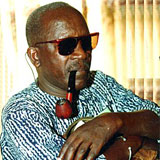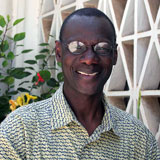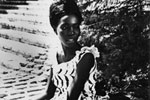NYS WRITERS INSTITUTE
HOME PAGE

 THE FILMS OF OUSMANE SEMBÈNE
THE FILMS OF OUSMANE SEMBÈNE
WRITERS INSTITUTE TO PRESENT
“THE FILMS OF OUSMANE SEMBÈNE”
NYS Writers Institute, September 24, 2010
7:30 p.m. Film screening | Page Hall, 135 Western Ave., Downtown Campus
 NYS Writers Institute, October 1, 2010
NYS Writers Institute, October 1, 2010
7:00 p.m. Presentation and Discussion with Samba Gadjigo| Page Hall, 135 Western Ave., Downtown Campus
CALENDAR LISTING:
The New York State Writers Institute will present “The Films of Ousmane Sembène,” a mini-festival focusing on the work of African cinema’s “founding father.” The film “Moolaadé” (2004), about a women’s uprising in a dusty African village against genital mutilation, will be screened on Friday, September 24 at 7:30 p.m. in Page Hall, 135 Western Avenue on the University at Albany’s downtown campus. On Friday, October 1, at 7:00 p.m. in the same location, Samba Gadjigo, the world’s leading expert on the life and work of Sembène will present and discuss two short films by Sembène, “La Noire de… [Black Girl]” (1966) and “L’Heroisme au Quotidien [Daily Heroism]” (1999), as well as his own documentary, “The Making of Moolaadé” (2005). The events are free and open to the public.
PROFILE
“The Films of Ousmane Sembène” will feature notable examples of the work of African cinema’s “founding father.” The mini-festival will feature a screening of “Moolaadé” (2004) on Friday, September 24, and a presentation on Friday, October 1 by Sembène biographer Samba Gadjigo in association with the screening of three short films: “La Noire de…” [“Black Girl”] (1966), and “L’Heroisme au Quotidien” [“Daily Heroism”] (1999), both directed by Sembène, and “The Making of Moolaadé” (2005), directed by Gadjigo and filmed on location with Sembène in Burkina Faso.
 September 24 (Friday): MOOLAADÉ film screening
September 24 (Friday): MOOLAADÉ film screening
7:30 p.m., Page Hall, 135 Western Ave., UAlbany Downtown Campus
Directed by Ousmane Sembène
Starring Fatoumata Coulibaly, Maimouna Hélène Diarra, Salimata Traoré
(Senegal/Burkina Faso, 2004, 124 minutes, color, in Bambara and French with English subtitles)
Ousmane Sembène was 81 when he directed this masterpiece about a dusty village in conflict over the practice of female genital mutilation. Writing in the “Village Voice,” J. Hoberman called it, “brilliant… a work of unpretentious simplicity and formal eloquence.”
 Cosponsored by the School of Public Health in celebration of its 25th Anniversary.
Cosponsored by the School of Public Health in celebration of its 25th Anniversary.
October 1 (Friday): Film screenings with commentary by Sembène biographer Samba Gadjigo
7:00 p.m. [Note early start time], Page Hall, 135 Western Ave., UAlbany Downtown Campus
Samba Gadjigo, Professor of French and African Literature at Mt. Holyoke College, is the world’s leading expert on the life and work of Ousmane Sembène (1923-2007), Senegalese director and the “founding father” of African cinema. Gadjigo’s new landmark biography, “Ousmane Sembène: The Making of a Militant Artist” (2010) is a richly detailed work based on unprecedented access to the famously private film director and members of his family. Gadjigo will offer commentary following the screening of the following films:
 LA NOIRE DE . . . [BLACK GIRL]
LA NOIRE DE . . . [BLACK GIRL]
Directed by Ousmane Sembène (Senegal, 1966, 65 minutes, b/w, in French with English subtitles)
Sembène’s first feature is widely acknowledged as the “genesis” of African cinema. A stylish young African woman accepts a job as a domestic in the French Riviera only to discover that her employers regard her as little more than a slave.
L’HEROISME AU QUOTIDIEN [DAILY HEROISM]
Directed by Ousmane Sembène (Senegal, 1999, 10 minutes, color, in French with English subtitles)
Set in a small village in rural Senegal, the film is the first of a trilogy devoted to the daily heroism of African women at the beginning of the new century.
THE MAKING OF MOOLAADÉ
Directed by Samba Gadjigo (United States/Burkina Faso, 2005, 20 minutes, color)
Gadjigo spent two weeks with Sembène in a rural village in Burkina Faso during the 2002 filming of MOOLAADÉ, his widely acclaimed drama about a women’s uprising against female circumcision.
For additional information, contact the Writers Institute at 518-442-5620 or online at https://www.albany.edu/writers-inst.